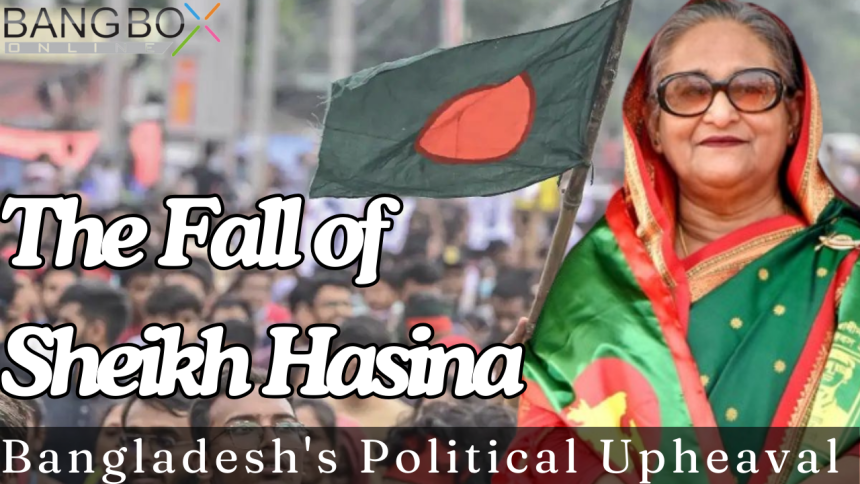
The Fall of Sheikh Hasina
The Tumultuous Fall of Sheikh Hasina: Bangladesh's Political Upheaval and Its Implications
Dhaka, August 5, 2024 - Bangladesh witness’s one of the most influential and power packed political development where the longest serving Prime Minister of country Sheikh Hasina resigned and escaped from Bangladesh due to weeks of continuous protests across the country. The conflict which resulted from manifestation against a political quota system in governmental sectors, doubted into mass embers turning into a large scale uproar which led to Hasina’s early exit and formation of an interim government under control of the army.
A Controversial Legacy and Rising Discontent
Sheikh Hasina, aged 76 years has been a pioneering leader in Bangladesh politics and currently the incumbent prime minister for an uninterrupted period since January 2009, preceded by an earlier term between June 1996 to March 1997. Her leadership really placed Bangladesh among the list of the fastest-growing economies of the world with improvement in infrastructure, health care and education sectors. Nevertheless, her period was not without controversy regarding autocratic rule, embezzlement of state funds and manipulation of elections.
The main reason for the recent unrest was the government’s action to restore the 30-percent job quota for the freedom fighters’ descendants that evoked great displeasure among the jobless young people. The quota system that was seen as discrimination triggered unrest in July before turning to a larger protest pressing for Hasina’s dismissal. This response such as the curfews imposed in several countries, shut down on the internet and subsequent violent suppression of the protesters only served to heighten the anger of the citizens involved.
The Fall of a Leader
On August 4, protesters expanded their demonstration, and for the first time youth activist attempted to march towards the secretariat in the capital, Dhaka. Clashes in which 14 policemen were shot leave at least 98 people dead, boosting the death toll from the recent unrest to more than 300. Anti-government protesters attacked the hub of power in Bangladesh leading to the destruction of symbolic images of Hasina including a statue of her father, the founding father of Bangladesh, Sheikh Mujibur Rahman.
Taking no chances, Hasina has had to escape to India, where she was said to have been welcomed at the Hindon Air Base near Delhi. This is a clear indication of the relationship between the two neighbours despite the fact that they are bitter enemies whereby Indian authorities, particularly NSA, Ajit Doval arranged for her safe exit. Hasina’s flight signals the end of her 15-year reign and leaves Bangladesh in an uncertain future.
Interim Government and Future Uncertainty
The announcement was made during a live broadcast of television, the newly appointed Army Chief of Bangladesh, General Wakeruz Zaman declared the formation of an interim administration to bring law and order in the country and to respond to the wish of the demonstrators. The spokesman of the country’s armed forces, General Zaman, said: “The country is in a revolutionary time,” and though he vowed to ensure law and order and stop the bloodshed. The interim government has the political mandate to pacify a nation in trouble as the people have continued to oppose the military take-over given the culture of coups and dictatorship in the country.
In this regard, president Mohammed Shahabuddin gave the signal of goodwill and democratic restoration by freeing opposition leader Khaleda Zia. Zia, the leader of Khaleda’s BNP party, former Prime Minster and Hasina’s fiercest contender, was incarcerated for corruption cases considered as politically motivated. Her release, together with, others arrested during the protestation show a sign that the political dialogue may be opening up.
Conclusion and Implications for India and Regional Dynamics
Another important player in the South Asian region, India, has been watching the developments intently. The Indian government being worried about insecurity in a neighboring country which borders India has enhanced security and encouraged its citizens not to travel to Bangladesh. The political situation in Dhaka which has been stereotyped with political instability has brought the political relationship between India and Bangladesh into the political uncertainty; security cooperation and economic entwinement.
During Hasina’s tenure, Bangladesh pursued a strategic balance between the two giants India and China where Bangladesh benefited from the investments of both countries but tilted more towards Indian strategic vision. This balance may be upended by a change of government, especially one under military supervision as it would free the door for increased Chinese and other regional powers’ penetration.
The Road Ahead
While Bangladesh is in this precarious crossroad, the world is keeping an eye on it. The articles of formation and the structure of the interim government, including their strategies for returning the nation to democratically elected leaders and dealing with people’s complaints, will be the significant factors in shaping the country’s future. The period of Sheikh Hasina has its moments of successes and notorious scandals and it shall remain a part of Bangladesh’s history as it tries to find its new leader and new way.
This unfolding political drama underscores the fragility of democratic institutions in the face of popular discontent and the complexities of governance in a rapidly changing world. The coming months will be crucial for Bangladesh as it confronts its most significant political crisis in recent history.





